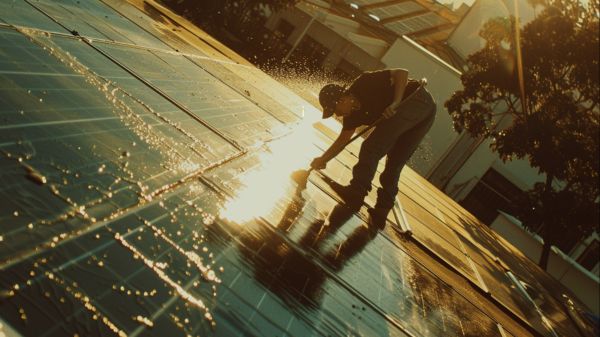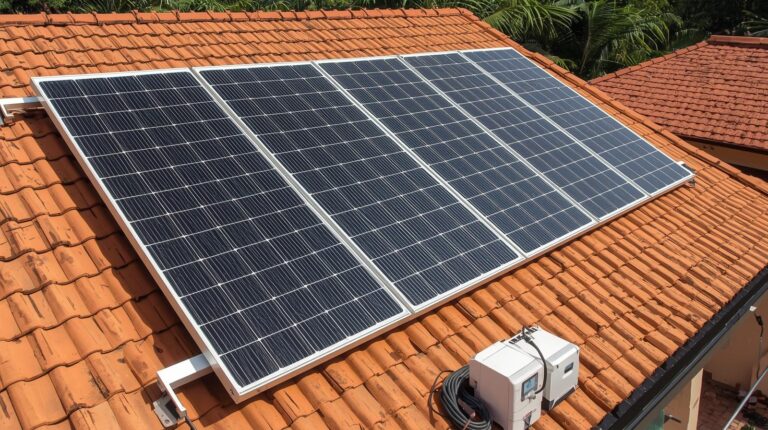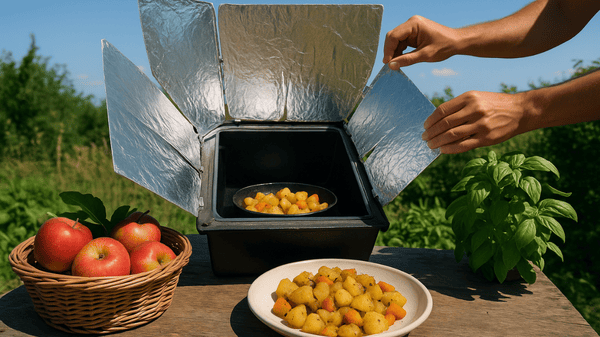To maintain peak efficiency, solar panels should typically be cleaned at least twice a year. Factors like geographic location, weather conditions, and tilt angle influence the frequency of cleaning. Consider cleaning more often (2-4 times yearly) in dusty or polluted areas, after pollen seasons or storms.
Dirty panels can reduce energy output by up to 20%, emphasizing the importance of regular maintenance. Bird droppings can create shadows and damage panels, warranting gentle cleaning methods. Professional services offer advanced cleaning techniques, while DIY cleaning is cost-effective with basic tools. Understanding these factors will help you determine the best cleaning schedule for your solar panels.
Key Takeaways
- Clean solar panels at least twice yearly.
- Adjust frequency based on location and weather.
- Dusty or polluted areas may need more cleaning.
- Regular maintenance sustains optimal energy production.
- Check for dirt accumulation regularly.
Factors Affecting Cleaning Frequency
When determining how often to clean your solar panels, several factors come into play that can influence the frequency of cleaning. The cleanliness of your panels directly impacts their efficiency in converting sunlight into energy. Here are some cleaning techniques and maintenance tips to keep in mind:
- Weather Conditions: Depending on where you live, the weather can affect how quickly dirt and debris accumulate on your solar panels. Areas with more dust, pollen, or pollution may require more frequent cleaning.
- Tilt Angle: The tilt of your solar panels can also impact how often they need cleaning. Panels with a steep tilt angle are less likely to accumulate dirt compared to panels with a shallow tilt.
- Cleaning Products: When cleaning your solar panels, use mild soap, water, and a soft sponge or cloth. Avoid abrasive materials that can scratch the panels.
Regular cleaning not only maintains the aesthetic appeal of your solar panels but also ensures optimal energy production over time.
Solar Panel Orientation and Tilt
To enhance the performance of your solar panels, it’s essential to take into account their orientation and tilt angles. The panel efficiency, which directly impacts the amount of sunlight your panels can convert into electricity, is greatly influenced by how they’re positioned.
When installing solar panels, the angle at which they’re set plays a vital role in maximizing their energy production. Here are key points to reflect on regarding solar panel orientation and tilt:
- Solar panels facing south tend to receive the most sunlight throughout the day, leading to higher energy generation.
- The ideal installation angle for solar panels is typically equal to your latitude, with adjustments made seasonally for peak performance.
- Tilt angles can vary based on your location and energy goals, so it’s important to consult with a professional to determine the most suitable setup for your specific needs.
- Adjusting the tilt angle seasonally based on sunlight availability can optimize energy production for off-grid solar systems.
Weather Conditions and Location
Considering the impact of weather conditions and location on solar panel performance is essential for enhancing energy generation. The amount of rain a region receives can noticeably affect how often you need to clean your solar panels.
Rain can help rinse off some dust and debris, reducing the frequency of manual cleanings. However, in areas where rain is infrequent, dust and grime can accumulate more quickly, necessitating more regular cleaning.
Additionally, high humidity levels in certain locations can lead to quicker buildup of dirt and pollutants on the panels, impacting their efficiency. It’s vital to take into account where your solar panels are located geographically.
Areas with heavy pollution or near construction sites may require more frequent cleanings due to increased debris in the air. Similarly, regions prone to dust storms or surrounded by agricultural activities may experience faster accumulation of dirt on the panels.
By understanding the weather conditions and location of your solar panels, you can determine the best cleaning schedule to maximize their energy production. Solar panel maintenance is crucial for ensuring optimal performance and longevity, as dirt and debris can impact energy output significantly.
Dust and Debris Accumulation
Dust and debris accumulation on solar panels can greatly hinder their efficiency over time. To keep your solar panels performing at their best, regular cleaning is essential. Here are some cleaning methods and maintenance tips to guarantee your panels stay in top condition:
- Regular Cleaning: Schedule regular cleaning sessions to prevent dust and debris buildup. Aim for at least two to four times a year, depending on your location and weather conditions. It is important to maintain the cleanliness of the panels to ensure optimal solar energy production.
- Use a Soft Brush or Cloth: When cleaning your solar panels, use a soft brush or cloth to gently remove dirt and debris. Avoid abrasive materials that could scratch the surface.
- Water Rinse: A simple rinse with water can help remove loose dirt and grime. Use a hose or a bucket of water to gently wash the panels.
- Professional Cleaning: If you’re not comfortable cleaning the panels yourself, consider hiring a professional service to guarantee thorough and safe cleaning.
Impact of Bird Droppings
Bird droppings can pose a significant challenge to the efficiency of your solar panels. The impact of bird droppings on solar panels includes:
- Blocking sunlight: Bird droppings can create a barrier between the sun’s rays and the solar panels, reducing the amount of sunlight reaching the cells and consequently decreasing energy production.
- Causing shading: Accumulated bird droppings can cast shadows on the panels, leading to hotspots that can damage the cells and decrease overall performance.
- Increasing maintenance needs: Bird droppings are acidic and can corrode the surface of solar panels over time, requiring more frequent cleaning and maintenance to prevent long-term damage.
To mitigate the impact of bird droppings on your solar panels, consider the following cleaning methods:
- Regular inspections: Check your panels for bird droppings and clean them promptly to prevent buildup.
- Gentle cleaning: Use a soft brush, mild detergent, and water to remove bird droppings without scratching the panels.
- Professional cleaning: Consider hiring professionals for thorough and safe cleaning of your solar panels, especially in cases of heavy bird activity.
Seasonal Variations in Cleaning Needs
With the changing seasons, the cleaning needs of your solar panels can vary considerably.
In spring, you may need to focus on a thorough cleaning to remove built-up dirt and pollen that accumulated during the winter months. Spring cleaning is vital to guarantee peak sunlight absorption. As the weather warms up, consider using a gentle cleaning solution and a soft brush to scrub away any residue effectively.
During winter, maintenance is important to keep your solar panels functioning efficiently. Snow, ice, and debris can accumulate on the panels, hindering their performance. Regularly monitoring your panels and clearing off any snow or ice can help enhance energy production during the colder months.
Remember to use caution when cleaning in winter to prevent damage to the panels. Adapting your cleaning routine to the seasonal changes will help maintain the effectiveness of your solar panels throughout the year.
Recommended Cleaning Schedule
Maintaining a regular cleaning schedule is essential for optimizing the performance of your solar panels. By adhering to a recommended cleaning schedule, you can guarantee that your panels operate efficiently and continue to generate maximum energy output.
Here are some cleaning techniques and maintenance tips to keep your solar panels in top condition:
- Frequency: Aim to clean your solar panels at least twice a year, preferably in the spring and fall, to remove accumulated dirt, dust, and debris.
- Water and Mild Soap: Use a garden hose with a gentle spray or a bucket of water mixed with mild soap to wash away surface grime. Avoid using abrasive materials that could scratch the panels.
- Soft Brush or Cloth: For stubborn dirt, gently scrub the panels with a soft brush or cloth to maintain their integrity.
- Regular Inspections: Periodically check for any signs of damage or shading that could affect the efficiency of your solar panels.
- Professional Cleaning: Consider hiring professional cleaning services for a more thorough cleaning, especially if your panels are difficult to access or heavily soiled.
DIY vs. Professional Cleaning Services
To decide between cleaning your solar panels yourself or hiring professional services, consider factors like accessibility, time availability, and the level of grime on your panels.
DIY cleaning can be cost-effective, especially if your panels are easily reachable and not heavily soiled. However, professional services may use specialized cleaning methods and have the equipment to access hard-to-reach areas effectively.
Cost comparison:
- DIY cleaning is generally cheaper as you only incur the cost of cleaning supplies.
- Professional cleaning services may have a higher upfront cost but could save you time and effort in the long run.
Cleaning methods:
- DIY cleaning often involves using a gentle soap solution and a soft brush or cloth.
- Professional services may utilize deionized water systems or automated cleaning equipment for a more thorough cleaning.
Evaluate your situation based on these aspects to determine whether DIY cleaning or professional services are the best choice for maintaining your solar panels.
Conclusion
In summary, maintaining a consistent cleaning schedule for your solar panels is vital to ensuring peak performance and efficiency. By considering factors such as orientation, weather conditions, and debris accumulation, you can determine the frequency at which your panels need to be cleaned.
Whether you choose to tackle the task yourself or hire a professional service, regular maintenance is essential to maximizing the lifespan of your solar energy system. Remember, a clean panel is a happy panel!




